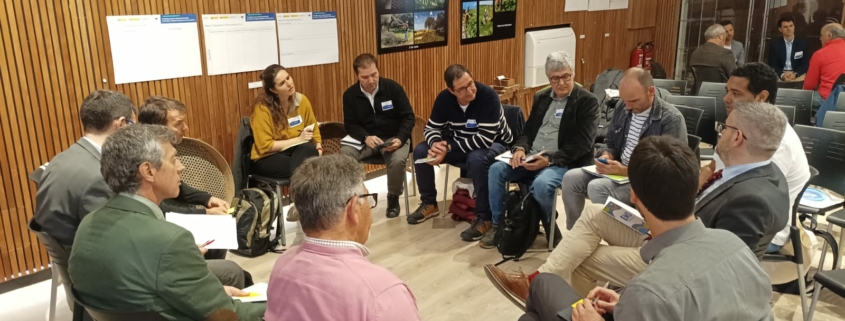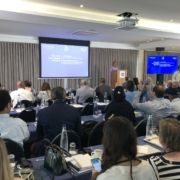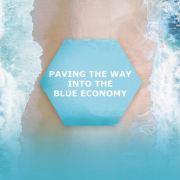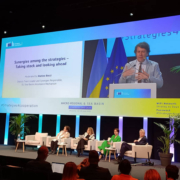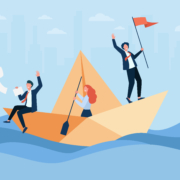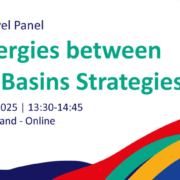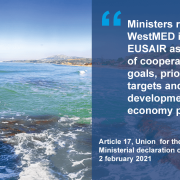Decarbonizing ports, fishing and recreational vessels. Expert proposals at participative WestMED Spain workshop in Mahón, Menorca
Haga clic aquí para el español
On April 17, 2024, the workshop ‘Prototypes for the decarbonization of Ports, Fishing and Recreational Vessels‘ took place in Mahon, Menorca (see agenda).
This Spanish National Event was organized by the Spanish National Hub of the WestMED Initiative Assistance Mechanism of the in collaboration with the Maritime and Logistics Cluster of the Balearic Islands. It was attended by 46 national and international experts on the decarbonization of ports, fishing vessels and recreational vessels.
The event targeted all Spanish-speaking Mediterranean and/or Atlantic stakeholders in the port, fishing and yachting sectors, as well as representatives from national and regional administrations. People came from a wide range of organisations including clusters, GALPs, associations, marine recreation, marinas, fishing ports, technology providers, port infrastructure developers, researchers, energy sector, shipyards (see list of attendees).
This workshop was selected by the European Commission as an official ‘EMD in My Country‘ event, as part of a larger EU-wide campaign consisting of many other events across the Union, designed to raise awareness about the importance of the oceans and seas.
Background
As with other economic activities in the EU, there is a growing need for our maritime fleets to transition and move away from fossil fuels as soon as possible. This is not only a contribution to the objectives of the European Green Deal, including the reduction of GHG emissions, but also to the profitability, sustainability and resilience of the sector (EU Commission, 2023). The challenges faced by fleets in undertaking an energy transition range from regulatory to technological.
The objective of this workshop was to discuss the challenges that decarbonization poses for recreational and fishing ports and vessels. It provided an opportunity to harnass the participants’ perspectives on fishing vessels and recreational vessels as well as their ports and facilities focused on this challenge.
By using the principles of ‘design thinking,’ participants identified and discussed possible prototypes, energy sources, technological solutions, regulatory frameworks, general opportunities and challenges to move towards decarbonization.
Setting the stage
The stage was set by several leading experts and policy makers, outlining the context and sharing the latest developments.
Mr. Héctor Pons Riudavets, Mayor of Mahon, opened the event and stated that “we need prototypes and public-private technologies adapted to the current reality to achieve our decarbonization goals”. Next, Mr. Antonio Ginard Lopez, Director General of the Port Authority of the Balearic Islands, highlighted that the Balearic Islands are already addressing the challenge of decarbonizing their ports with several activities and work axes.
Ms. Iolanda Piedra, president of the Maritime Maritime and Logistics Cluster of the Balearic Islands, stressed that Spain wants and needs to be a European and global reference in marine decarbonization.
Mr. Omar Collado, national coordinator of the WestMED Initiative on behalf of the Ministry of Foreign Affairs, indicated: “All maritime sectors need to collaborate to achieve a sustainable Blue Economy. We need concrete, realistic and truly sustainable projects and technologies to move towards the energy transition that the EU needs”.
Mr. Francisco Manuel Fernández, from the Ministry of Agriculture, Fisheries and Food, stressed that the ideas that will be developed through the participatory workshop are essential to advance the decarbonization of the fisheries sector. He emphasized that most Mediterranean fisheries in Spain are artisanal fleets and that providing decarbonization solutions to these fleets is a challenge we need to address.
Roundtables
After a short break, participants were split and divided over three thematic roundtables according to predifined preferences.
TABLE 1: Decarbonization prototypes for fishing and recreational ports
TABLE 2: Decarbonization prototypes for fishing vessels
TABLE 3: Decarbonization Prototypesfor recreational vessels
Each table was then asked to:
1: Identify of challenges/barriers/strengths
2: Prioritise the top 3 challenges
3: Identify a roadmap for these 3 prioritized challenges
Results
A brief summary:
Table 1: Proposals for ports to become energy generators
Three proposals were selected: a mobile platform that allows energy generation (eco-deck), a turbine farm that harnesses the power of waves to generate electricity and a project to generate green hydrogen in ports based on the example of the port of Vigo.
Table 2: Projects for the decarbonization of the fishing vessels
Prototypes were proposed for the digitalization and analysis of the energy needs of each type of fishing gear (data platform). A project for testing a hybrid solution (electric and diesel) on a 10-meter vessel was also proposed.
Table 3: New models of green energy powered vessels
Different projects were selected, such as the adaptation of catamarans to a hybrid model (biodiesel and electricity), the development of an application to monitor the autonomy of ships, the electrification of passenger ships or the construction of a ship powered by biodiesel and hydrogen.
Each table then shared and discussed their findings with the full group of participants.
The day was concluded by summarising key take-home points and outlining next steps.
Next Steps
The full results will be compiled in a document entitled “National Event from WestMED Initiative in Spain: Prototypes for the decarbonization of Ports, Fishing and Recreational Vessels” which will be delivered to the EU Energy Transition Partnership so that they can take them into account when developing their roadmap for 2024.
This document can be requested, free of charge, by contacting the WestMED National Hub Spain.
Media coverage
This event was widely covered by the press: on television (IB3/ Noticies) and in online media
Online articles
Pressreader Spain
Menorca.info
Xunta de Galicia 1 | Xunta de Galicia 2
Galicia Press
CostaOeste
NoticiasVigo
Govclipping
La Voz de Galicia
Cluster Marítimo Español

